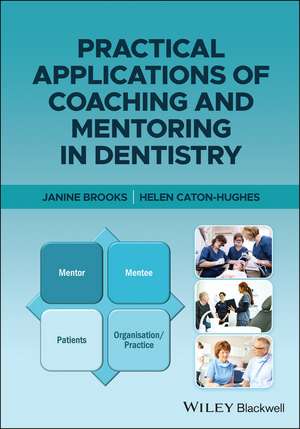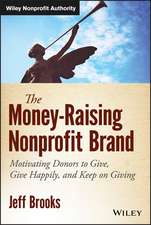Practical Applications of Coaching and Mentoring in Dentistry
Autor J Brooksen Limba Engleză Paperback – 21 apr 2021
Practical Applications of Coaching and Mentoring in Dentistry offers a comprehensive overview of the theory of coaching and mentoring as it applies to the field of dentistry.
The book includes practical case studies that demonstrate how dental professionals have implemented coaching and mentoring into their daily practice. Grouped into themes such as remediation, foundation training, outreach training, and specialist practice, it also explains the coaching and mentoring techniques chosen and applied. Core topics include:
- A thorough introduction to the mechanics of mentoring
- The characteristics of typical mentors, mentoring engagements and the different types of mentoring
- What mentoring can achieve
- An exploration of business coaching, including the difference between mentoring and coaching
- Discussions of the various types of models used within mentoring and coaching
Preț: 353.00 lei
Preț vechi: 371.57 lei
-5% Nou
Puncte Express: 530
Preț estimativ în valută:
67.55€ • 73.35$ • 56.75£
67.55€ • 73.35$ • 56.75£
Carte disponibilă
Livrare economică 01-15 aprilie
Preluare comenzi: 021 569.72.76
Specificații
ISBN-13: 9781119648260
ISBN-10: 1119648262
Pagini: 160
Dimensiuni: 172 x 243 x 10 mm
Greutate: 0.36 kg
Editura: Wiley
Locul publicării:Chichester, United Kingdom
ISBN-10: 1119648262
Pagini: 160
Dimensiuni: 172 x 243 x 10 mm
Greutate: 0.36 kg
Editura: Wiley
Locul publicării:Chichester, United Kingdom
Notă biografică
About the Authors
Janine Brooks is Lead Clinical Tutor at the University of Bristol and Educational Inspector for the General Dental Council. She is Trustee of the Dentists' Health Support Trust and Coach for the Professional Support Unit in Thames Valley. She is also Chief Executive Officer of Dentalia Coaching and Training Consultancy.
Helen Caton-Hughes is an author, coach, and founder of the Forton Group of companies. She is an assessor for the International Coach Federation and a coach supervisor and mentor. She works across the spectrum of health management, business development, and marketing.
Cuprins
About the Authors xii
List of Contributors xiv
Foreword xvi
Acknowledgements xviii
1 Introduction 1
History 2
Uses of Mentoring 3
Distinctions and Boundaries 4
What's Inside This Book 6
How to Use This Book 6
References 7
2 Mentoring 9
In Its' Simplest Form the Mentoring Equation Is: Teacher + Coach = Mentor 9
Who is a Mentor? 11
Why Be a Mentor? 11
Reverse Mentoring 11
Inter-professional Group Mentoring 12
The Roles of an Effective Mentor 12
What Can Mentoring Achieve? 14
Choosing a Mentor 15
The Power Relationship in Mentoring 15
Compatibility and Rapport 16
Diversity 16
Degree of Interest 16
Logistics 16
Personality 17
Roles and Responsibilities 17
Matching Mentor and Mentee 17
Ethics 18
Supervision 20
The Current State of Play 21
Conclusion 22
References 22
3 Coaching 23
What is Coaching? 23
Purpose of Coaching 25
Example 25
Some Coaching Examples 26
Distinctions Between 'Coaching' and 'Mentoring' 27
Ideas that Underpin Coaching 28
Resources and Resourcefulness 28
Egan's "Skilled Helper" Model 29
The Traditional Role of a Skilled Helper 30
How Does Coaching 'Work'? 31
Conclusion 32
References 32
4 The Forton Model 35
Skills and Competencies of Coaching 35
Definition of a 'Skill' 36
Definition of Competency 36
The Role of the Coach 37
Tools for Mentoring and Coaching 37
The Coaching 'Journey' 38
Purpose 38
Reality 38
Plan 39
Action 39
Review 39
The Forton Model 39
Coaching Principles 40
Partnership 40
Principle Two: Trust 43
The Coach Trusting Themselves 44
Principle Three: Presence 44
Principle Four: Possibility 45
Principle Five: Accept, Blend, and Create (A, B, and C) 46
The Skills of Coaching 46
Receptive Listening 47
Asking Great Questions 48
The Skills of Reflecting 49
The Skills of Supporting 50
The Steps of the Coaching Conversation 51
Purpose: Setting and Meeting Objectives 51
Scoping Questions: The Coaching Conversation Purpose 51
Current Reality 52
Tapping into the Coachees' Resourcefulness 53
New Insights - The Plan Step 54
Tactics 55
Overcome Barriers 55
Review Steps 55
The Review Step: From One Conversation to Another 56
Reflective Learning in Coaching 56
Receiving Feedback 57
The 'Field', or the World of the Coachee 58
References 58
5 Practical Case Studies 61
Background to the Case Studies 61
Improving UK Dental Service Quality 61
Underpinning Concepts 62
The Role of Coaching and Mentoring in Supporting Dental Service Quality 63
The Case Study Projects 64
Case Study Categories 64
Category One Case Studies: Dentists in Difficulty Including PASS 64
Local Dental Committee (LDC) 64
Practitioner Advice and Support Scheme (PASS) 64
PASS Aims and Objectives 65
PASS Processes 65
Case Study One 65
Thames Valley PASS Contributor: Dr. Barkat Ahmed BDS 65
Programme Success Indicators 65
Referrals to the Mentoring Scheme 67
Mentoring Group Evaluation 69
Case Study Two 70
The Dorset PASS Contributor: Mrs. Sarah Jackson BDS 70
Case Study Three 72
Dentists in Difficulty Including PASS Contributor: Dr. Sumair Khan BDS 72
Case Study Four 74
Designing and Implementing a Mentoring Scheme in Birmingham Contributor: Dr. Ahmad El-Toudmeri BDS 74
Category Two Case Studies Evaluation 77
Case Study Five 78
An Evaluation Methodology: A Piece of Reflective Writing for PAG Contributor: Dr. Claudia Peace BDS 78
Category 3 Case Studies: Early Years in a Dentists' Career 80
Case Study Six: Educational Supervisors and Foundation Dentists 80
Contributor: Dr. Frederick Fernando BDS 80
Evaluation of the Educational Supervisor as a Mentor 82
Issues Uncovered During the Process 82
Poor Performance 83
Communication 83
Poor Self-awareness 83
Case Study Seven: Assessing How Coaching and Mentoring Can Impact Dental Students in an Outreach Setting Contributor: Dr. Stephen Denny BDS 84
Southend Outreach Academic Clinic 84
Creating the Mentoring Environment - Spheres of Influence 85
Case Study Eight: Year 1 Post Foundation Dentists Contributor: Dr. Keith George BDS 88
Case Study Nine: Smile Restorative Mentoring Programme Contributor: Dr. Jin Vaghela BDS 89
Why Mentoring? 90
The Mentors 91
Category Four Case Studies: Risk Management and Quality Assurance (QA) 91
Case Study Ten: Denplan Risk Management/QA (Contributors: Dr. Ewa Rozwadowska BDS and Dr. Catherine Rutland BDS) 92
Risks Experienced by Dentists 92
Category Five Case Studies Tools/Models 95
Case Study Eleven: Using Coaching Cards - Tools or Props? Contributor: Ms. Jane Davies-Slowik MBE BDS 95
Domain 1: The Principles of Coaching 97
Domain 2: Coaching Skills 97
Domain 3: The Steps 98
Domain 4: The Field, i.e. Resources 98
Emotional Intelligence 99
Coaching for Values 99
Practical Ways of Using Coaching Cards for Team Coaching 99
Practical Ways of Using Coaching Cards for Individual Coaching 100
Self-development 101
Conclusion 101
Case Study Twelve: Contributor: Mrs. Shilpa Chitnis BDS 102
P - PERSPECTIVE 102
E - EMPATHY 102
A - AWARENESS 103
R - RAPPORT 103
L - LISTENING 104
S - SUPPORT 105
References 106
6 Discussion 109
Beyond One-to-One: Coaching and Mentoring Groups and Teams 110
Group Coaching and Mentoring 110
Team Coaching and Mentoring: Shared Goals and Direction 111
Coaching in Virtual Environments 111
Coaching in Organisations: Organisational Dynamics, Does Size Matter? 112
Coaching and Mentoring Boundaries 112
How and When to Use Coaching and Mentoring 113
Barriers to Introducing Coaching and Mentoring 114
Attitudinal Barriers 114
Structural Barriers 115
Typical Benefits of Coaching and Mentoring 115
Impact of Coaching and Mentoring 116
Prevention 116
Neutralising 116
Remediation 116
Performance Conversation 116
Development Conversation 117
Themes from the Case Studies 117
Personal Performance 117
Health and Well-Being 118
Key Take Away Messages 120
Communication 120
Key Take Away Messages 121
Mentoring and Coaching as Regular and Every Day 122
Key Take Away Message 122
Supportive Culture for Coaching and Mentoring 122
Key Take Away Messages 122
Share and Enjoy 123
Key Take Away Messages 123
Integrating Mentoring into Structures and Systems 123
The Whole Professional Career 123
Key Take Away Messages 124
Organisational Culture 124
Myth Busting 125
'Deskilling' 125
Anyone Can Mentor 126
Age - 'reverse mentoring' 126
Inter-professional Mentoring 127
Reflection is Not Measurable; Therefore, Not Worthwhile 127
Failure is Failure - Or is It an Opportunity to Learn and Improve? 128
No Time to Mentor 128
A Note for Covid-19 129
Conclusion 129
References 130
Glossary of Terms - Organisations and Other Descriptors 133
Further Reading 139
Index 140


